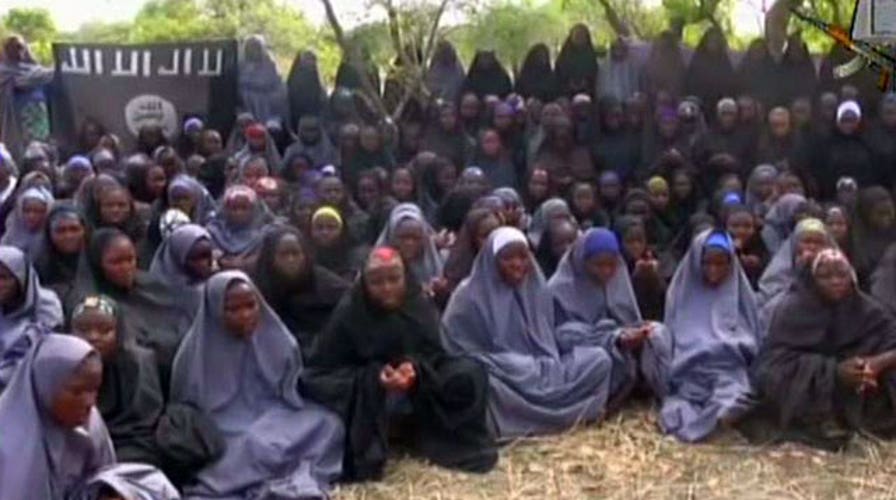Rescuing Nigerian schoolgirls a 'logistical nightmare'
KT McFarland explains obstacles in region
American drones were scouring a region the size of West Virginia in northern Nigeria for nearly 300 Christian schoolgirls kidnapped a month ago by a maniacal Islamic warlord, but the effort faced a potential roadblock in a rarely-invoked U.S. law that bars the military from helping certain governments.
The U.S. effort comes as pressure mounts for military action to hunt down the jihadist terror group Boko Haram and its leader, Abubakar Shekau. They are accused of snatching more than 300 girls, who Shekau vowed in a chilling video to sell into slavery. Some 50 later escaped, but the group is believed to be holding at least 276.
"If they knew where they were, I certainly would send in U.S. troops to rescue them, in a New York minute I would, without permission of the host country," Sen. John McCain, R-Ariz., told The Daily Beast.
But a senior State Department official said the girls have not been located and that a 1997 law known as the Leahy Amendment is complicating the joint effort with Nigerian forces. The law, named for its sponsor, Sen. Patrick Leahy, D-Vt., bars U.S. forces from working with militaries, or units within them, accused of chronic human rights violations. In the past, U.S. military brass have complained the law has prevented them from training foreign soldiers. In Nigeria, it appears to be limiting what forces on the ground can do to help find the children.
"For example, there is a specific counter-terrorism unit with which we don’t interact in Nigeria because we’re not able to [because of] Leahy," the official said. "However, we’re not prevented from working with the Nigerian military for those soldiers or units that were not affected, and we are doing training on human rights training and on appropriate use of force with the military for those elements that we can work with."
The official said the U.S. has no plans to send U.S. personnel beyond the 30 or so already in Nigeria, where they are working with forces from France and Great Britain. He indicated that they were there primarily to give logistical and technical support, particularly on communication with the Nigerian people and with neighboring countries.
"The United States has already been very forthcoming and clear about the kind of approach that needs to be taken in – to counter terrorism," the official said. "There can’t just be a military response; you have to have a holistic response. You have to deal with legitimate grievances that might be in a region."
In addition to drones, Pentagon spokesman Col. Steve Warren confirmed Wednesday the U.S. is flying unarmed, manned aircraft over the country to provide intelligence to the U.S. Embassy. But although some 200 Marines will be sent to Sigonella Air Base in Sicily to help with "general unrest in the region, in North Africa," Warren said the U.S. has "no intention to put Americans on the ground in Nigeria for the purpose of a rescue effort."
The terror group, believed to consist of as many as a few thousand fighters, is thought to be hiding in rural areas, mountain caves and the dense Sambisa forest bordering Cameroon.The State Department official said there is no evidence the girls, some 130 or so who appeared on a video released this week, have been split up or moved out of the country. In that video, terrified girls were shown huddled together, dressed in gray Islamic veils as they sang verses from the Koran. The footage was verified as authentic by Nigerian authorities, who said 54 of the girls had been identified by relatives, teachers and classmates who watched the video.
Also in that video, a camouflage-clad Shekau appeared separately from the girls, an assault rifle slung over his chest, and warned menacingly: "I swear to almighty Allah, you will not see them again until you release our brothers that you have captured."
He said the girls, most of whom are Christians, had converted to Islam.
Security experts are among the personnel Britain has sent to Nigeria, where they are offering "longer-term counter-terrorism solutions to prevent such attacks in the future and to defeat Boko Haram." The more muscular aid from allies and the increasingly desperate situation faced by the girls seemed to spur U.S. lawmakers to call for a more aggressive American response.
"If the president decided to use special forces, I certainly would not oppose them. I realize all the complexities involved, all the dangers involved," said Rep. Peter King, R-N.Y. "But as commander-in-chief, if he made that decision, I would support him."
Boko Haram, whose name means "Western education is sinful," has waged a five-year campaign of bombings, massacres and abductions that has killed thousands in its drive to impose an Islamic state on Africa's most populous nation. It has tried to root out Western influence by targeting schools, as well as attacking churches, mosques, government buildings and security services in the country of 170 million, divided between a predominantly Christian south and Muslim north.
The Associated Press contributed to this report.

